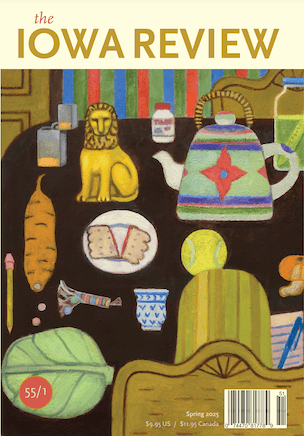In this issue: the livelong sidelong, Nick Hoult, compression socks, a note from Pam, MAMILS (Middle-Aged Men in Lycra), a small cuss, Chichu Bijutsukan, two different kinds of reckonings, and more.
Poetry
Michael Chang | Baby Blues
Mitchell Jacobs | Dumb Dead Dad | Foreplay
Jackson Melnick | Laredo | Before Alaska
Zach Savich | Entresol
Eleanor Tennyson | The First Season | The Rose Garden | Self-Portrait in Winter
Marisa Tirado | O, Jo | Tracy Emin & You
Jess Turner | What Dark Found, What Clatter | Little Disobeys
J. Villanueva | Kicking the Door Down
Carolyn Williams-Noren | Economics IV [1989] | Economics III [1984] | English III [Now]
Stella Wong | escape key | Chopin Liszt | Baskerville sound
Nonfiction
M. C. Benner Dixon | How to pray for rain when you no longer believe in God
Bronson Lemer | Over There
Caite McNeil | Rescue Distance
Devin Thomas O’Shea | Sauget, Illinois
Fiction
Anthony Cardellini | Church
Michael T. Farwig | A Dream of a Bright Blue Sky
Joshua C. Gaines | Spontaneous Generation
Reed Kuehn | Cheese
Alastair Wong | Gesamtkunstwerk: Total Work of Art
Kion You | Cross-Country
A Studio on the Atlantic
Céline Bagault, trans. Katie Dunnahoo | The Clippings
Caelainn Barr | A Word For That
Nicolas Matos Itxaso, trans. Vicky Smith | Jai Alai: The Joyful Game
Sarah Khatry and Wyatt Williams | Ingredients for Belonging
Sarah Minor | Hive Mind: An Introduction
Walid Hajar Rachedi, trans. Alexandra Hudson | The Voyage Inside Out
Lionel Ruffel, trans. Andrew Miller | To the Depths of the Unknown
Editor’s Note
The Mixdown
We all know that writers are solitary folk. Hermetic. Reclusive. Misanthropic? However positively or negatively you want to spin it, or however far you want to tax your thesaurus, it can’t be denied that writers need a lot of alone time to gather their thoughts and wrestle them onto paper. I imagine myself a Romantic hero tramping over the moor and scowling, even if I’m typing on my laptop at Press Coffee.
But what happens when writers collaborate? A group of them found out last year, as Sarah Minor describes in her introduction to a special section in this issue on A Studio on the Atlantic, a project spanning universities, media, and an ocean. I’ll leave the details to her, but one of my favorite moments of this collab was a WhatsApp exchange in which Sarah asked a group of visiting French authors and students if they’d like to convene at the Deadwood to watch Caitlin Clark in the NCAA women’s basketball Final Four. “Yes I am in!”—“I’m also in!”—“Yes I’m thrilled!”—“Oh I am down too!!” came the immediate replies. Who knows what fodder that evening’s unlikely gathering provided for future French literature?
A literary magazine like TIR is also a collaboration. It’s more than one person could ever do alone, nor would we want one person to do it alone. The multiple voices not only in the writing, but in the editorial choices made, create something larger but still human, gestalt-y, the combined brainwaves of people living and thinking in a particular moment.
When digital editor Richard Frailing sent me the audio file of the roundtable discussion that you’ll find on page TK, he titled it the “Paris Mixdown.” I was charmed by the word “mixdown,” which I hadn’t heard before. In the world of music and recording, it’s the process of combining multiple tracks into one.
I started thinking of this issue as a mixdown. Our usual genres of fiction, poetry, and nonfiction, plus an example of visual literature (you may have noticed a new category for it in our submissions portal), plus the winners of our biennial veterans’ contest, plus the podcasts and cultural exchange of the Studio on the Atlantic. All packaged beneath a cover painting, “Home School,” by Nora Riggs, which is itself a mix of objects that together create a portrait of an education.
When I told managing editor Alicia Wright about my mixdown metaphor, she came up with another for the issue, involving a different one of the senses: “a tasting menu.” I like that one too.
Collaboration, that underappreciated skill of writers—it puts fried pickles and PBR in front of Parisians at an Iowa pub; it lays dozens of tracks into a final song; it typesets and prints and binds it, and in the last bit of collaboration, a reader sits down and reads. Which leads to writers who are not only secluded, grumpy, a bunch of cats refusing to be herded, etc., but also connected, communicating, mutual, cooperative, accompanied.
—Lynne Nugent

